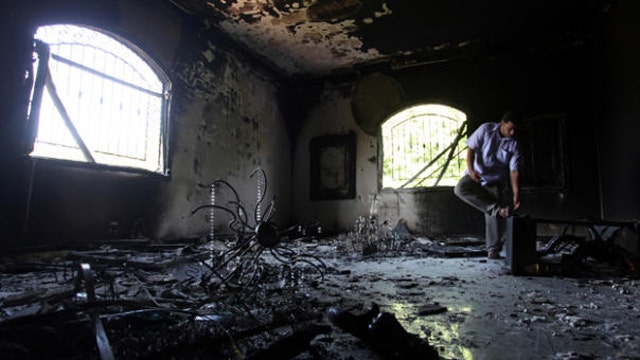A top State Department official scheduled to give congressional testimony this week on the fatal attacks on the U.S. outpost in Benghazi, Libya, says he knew immediately they were terror strikes, not a protest turned violent, according to interview transcripts released Sunday.
“I thought it was a terrorist attack from the get go,” says Greg Hicks, a 22-year foreign service diplomat who was the number two U.S. official in Libya at the time of the Sept. 11, 2012, attacks. “I think everybody in the mission thought it was a terrorist attack from the beginning.”
Hicks is one of two self-described State Department “whistle-blowers” scheduled to testify Wednesday before the Republican-led House Oversight and Government Affairs Committee. The other is Mark Thompson, a former Marine and now the deputy coordinator for operations in the agency’s Counterterrorism Bureau.
The third witness, Eric Nordstrom, an agency diplomatic security officer who was the regional security officer in Libya, has already testified before Congress.
Their testimony also comes amid recent concerns that the State Department is perhaps intimidating officials who know about the attacks and want to testify.
Hicks is highly critical of the Obama administration’s explanation in the immediate aftermath of the attacks -- that the strikes were sparked by earlier protests in Egypt over an anti-Islamic video.
The attacks killed U.S. Ambassador Christopher Stevens and three other Americans.
“For there to have been a demonstration on Chris Stevens' front door and him not to have reported it is unbelievable,” says Hicks, according to the transcript provided by the committee. “And secondly, if he had reported it, he would have been out the back door within minutes of any demonstration appearing anywhere near that facility. And there was a back gate to the facility, and, you know, it worked. … Chris' last report, if you want to say his final report, is, "Greg, we are under attack."
He also expresses frustration about why U.S. Ambassador to the United Nations Susan Rice appeared on all the major Sunday talk shows five days after the attacks and said they were sparked by protest and not premeditated, as Libya President Magarief was saying otherwise.
“I reported an attack on the consulate,” Hicks says in the transcripts. “It's jaw dropping that to me how that came to be. … I was personally known to one of Ambassador Rice's staff members. And, you know, we're six hours ahead of Washington. Even on Sunday morning I could have been called.”
The transcripts were released by House oversight committee Chairman Darrell Issa during an interview on CBS' "Face the Nation."
"We know one thing, the talking points were right, and then the talking points were wrong," said Issa, R-Calif. "The CIA knew it was a terrorist attack, the deputy chief of mission, Gregory Hicks, knew it was a terrorist attack, the ambassador before he died, one of the last words he ever said is, ''We`re under attack.``
The release of the transcript follows committee member Rep. Jason Chaffetz's suggestion that potential witnesses to the attacks are being intimidated by the State Department; but they will come forward after the whistle-blowers testify.
“I think these people are afraid of retaliation, afraid of what the State Department will do to them,” Chaffetz, R-Utah, told “Fox News Sunday.” “Others are out there and will testify.”
He also said, "There are people -- more than one -- that have felt intimidation from the State Department."
President Obama and the State Department have denied knowledge of such actions.
“I’m not familiar with this notion that anybody has been blocked,” the president said last week.
Massachusetts Democrat Rep. Steve Lynch told Fox on Sunday that independent investigators interviewed more than 100 witnesses and determined “no breach of duty” during the attacks.
Lynch, also a member of the House oversight committee, defended House Democrats on the issue, saying the Republican-led chamber calls the hearings and picks witnesses.
“We don’t have the ability to hold a hearing,” he said.













































